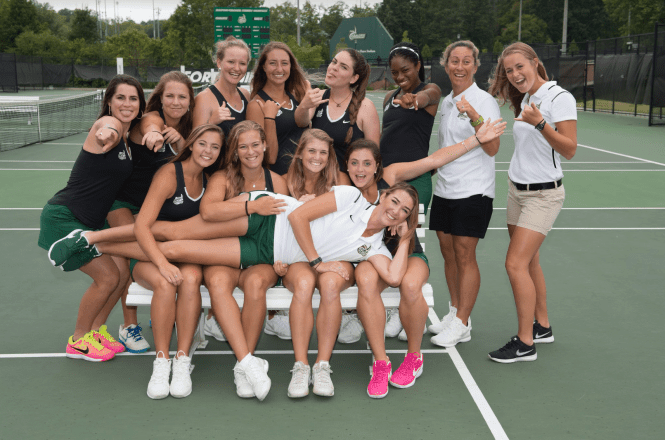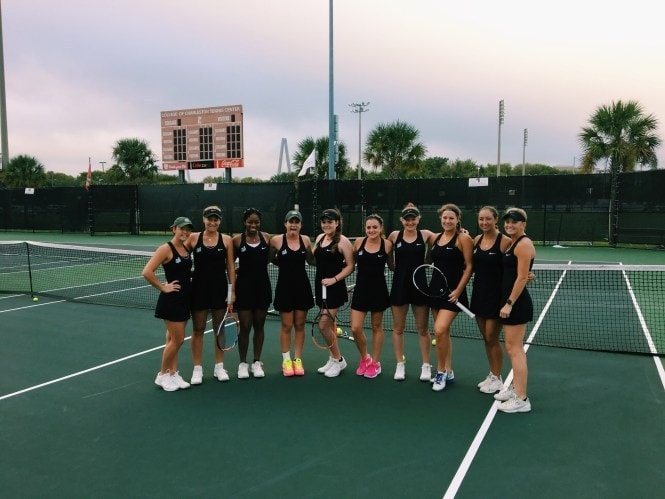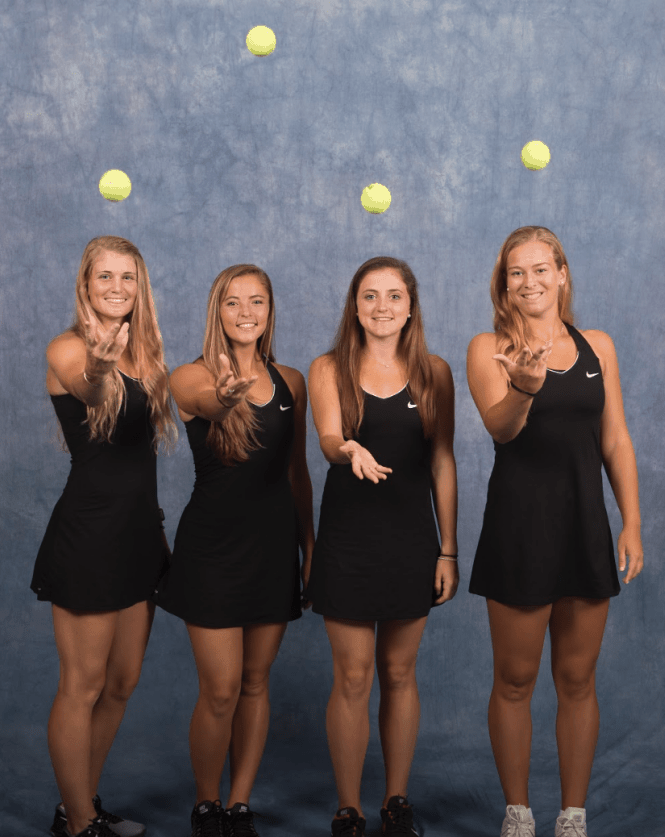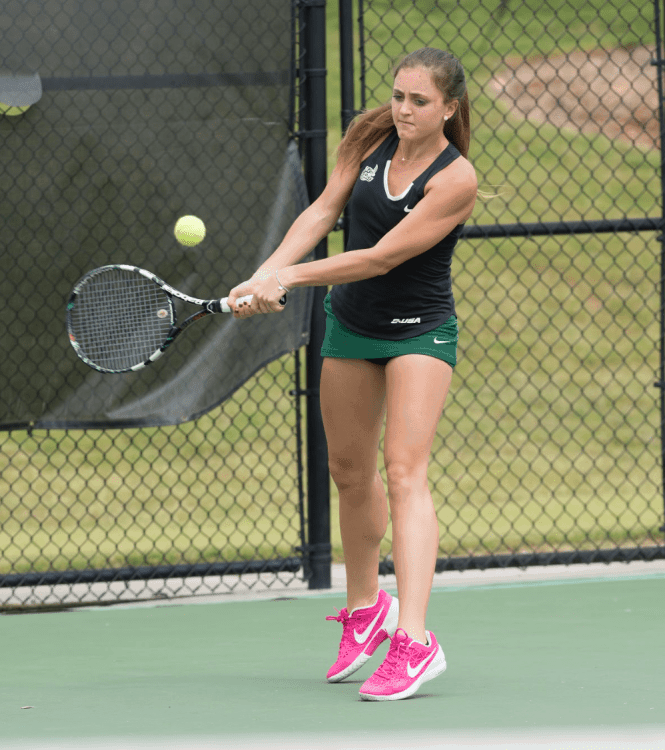 Moving on from something for good is hard. Especially after a 14 year, very committed relationship. Through the ups + the downs, the celebrations + the injuries. Giving it my all, day in + day out. It shaped me as a person + left me with memories I will never forget.
Moving on from something for good is hard. Especially after a 14 year, very committed relationship. Through the ups + the downs, the celebrations + the injuries. Giving it my all, day in + day out. It shaped me as a person + left me with memories I will never forget.
Being on the tennis court is such a huge part of my memories from growing up. After all, 14 years was a large majority of my life + was some of the most formative years of my childhood. Tennis is an individual sport, which brought about a whole range of lessons + challenges. Tournaments on the weekend. Traveling to parts of the country that I’ve never seen or heard of. Meeting people I otherwise may never cross paths with. Practice (before +) after school. The nerves before a match. The celebration after a big win. The recognition for my dedication to the sport. Tennis was my identity. It was what people knew me for. I lived + breathed competitive tennis up until my retirement from Division I Collegiate athletics.
Collegiate tennis was such an accomplishment, but I never really looked at it that way. It was our job. Our entire life. It was always THE goal of mine, so it just seemed like my next & final step after high school + junior tennis. While I was a student-athlete, I didn’t have much time to thinkabout it. I knew I was busy, but I never really thought about it. I didn’t reflect much, I was always busy, sweaty, on the go. Between tennis, the responsibilities that go along with being a student-athlete, + my academics, the last thing I wanted to do was think everything that I was doing. My time was very structured from the moment I woke up to the moment I laid down at night. I used any second of free time that I had to further myself in either my academics or tennis. There was no opportunity for me to get behind or catch up. There was no time to think about what I was doing, let alone plan for life after collegiate sports.

As a student-athlete, the attention was always on us. Our coaches, athletic trainers, + physical trainers always pushing us to improve on the court, in the gym, stay healthy + prevent injuries. Our academic advisors + professors encouraged us to excel in the classroom. Our friends, classmates + the rest of the student body often cheering us on in our competitions but never really understanding the pressure we were under. The frequent reminders from our parents + families to stay on track with all of the above. Everyone else had a very narrow focus + we were the ones that were responsible for keeping up with + excelling at it ALL.
Often wearing our school gear, everyone knew who we were. We were held accountable for every single thing that we did from class attendance, to our grades, to the food we ate, the amount of water we drank. Running a little bit slower? It was noticed. Lifting less weight than usual? Someone took note. We also had a lot of people to report to, from our parents, advisors, coaches, professors, friends. Go out on a week night? You’ll definitely pay for that one! We usually weren’t allowed to participate in other activities for fun, for fear that we would get injured… thus preventing us from playing our sport (aka our job). Now before you think I’m complaining about any of this, I’m NOT. I truly + honestly loved these aspects of being a student-athlete. I honestly really didn’t even think about it. It was just part of the job since day one. It was just a part of being a collegiate athlete.

Fast forward to post-grad…
When I initially graduated + retired from tennis, I was mentally + physically tired. I needed a break. I didn’t want to step on the court for a while, or hold a racket. Or smell a can of open tennis balls. I took quite a few months off. It felt like the best thing to do… for my mind + body. When I first stepped on to the court for the first time, it was frustrating. I hadn’t practiced in months. My consistency + entire game was off. It was frustrating because I knew I could compete at a certain level but I definitely wasn’t there now. I also played competitive tennis for so long that it was hard to play for fun. I will always have that competitive side to me. Tennis just hasn’t been the same. Which seems obvious… I mean, yeah I’m not a D1 athlete anymore.
Despite my time away from the sport, I still had not reflected on my experience as a student athlete. I really didn’t give any thought to just HOW busy I was. What I gave to the sport. How much it impacted my life. How big of a part of my identity it was. It wasn’t until about one and a half years after graduation that it really hit me. Hard. Out of nowhere. I found myself reflecting on my experience in depth. It brought about a lot of emotions. It suddenly felt like I lost a huge part of my life. The transition became a challenge for me. Mentally + physically. I’m honestly not sure why it was such a delayed onset but I am sure it was coming one time or another.

Initially there was the usual phase of adjusting to life after graduation, working an 8-5 job, financial responsibility, giving up some of the freedoms that I once had as an undergrad. But more than that, I found myself struggling with the loss of the game + my entire identity that surrounded that. Whilst my friends were adjusting from their loss of a life as a student, I never really had a traditional student experience as an undergrad. I was struggling with an adjustment from so much more than that. It felt like I lost everything that I ever knew. My stress reliever. My teammates. The support + structure that I was accustomed to.
I read this excerpt, which took the words right out of my mouth: “What we as athletes take note of is how important everyone else sees us when we are in that role. That role then starts to take full shape in our minds. We start to think that we are valued most as an athlete. We are cared for most when we put on that uniform. We are exalted for what we do within the confines of those white boundaries. Slowly we start to look at ourselves in the same way. We are important. On the field. We are cared for. On the field. We are valuable in society, On the field.” When the opportunity to put on the uniform + competitively play the sport is gone, that sense of value + identity feels lost.

When I had free time, I didn’t know what to do with it. I never really had free-time as a student-athlete. There was always something. As Shannon Miller, the most decorated gymnast in America, talked about the difficulty of life after she left her sport, “I didn’t know how to be a regular person. I initially watched a lot of TV and gained four dress sizes. It was very disheartening but it helped me realize that I had to find a new passion in life.” And I totally agree. As my tennis career comes to an end, there is more out there for me to see + experience. I have to reinvent myself.
Strangely enough, I miss it. All of it. The early morning workouts. Being a sweaty mess for 8+ hours of the day. The ice baths. Prehab + rehab. Traveling. Studying + eating while walking to class (it’s a skill). Arriving to class dripping in sweat from my third workout of the day (still haven’t showered) + ice on my joints. It was tough, but I didn’t really expect the transition to the real world, away from competitive sports to be tougher.
I went from working out multiple times a day a day to once a day, if I have the time + energy. Naturally, I gained more weight in this past year than I ever have. This was mentally hard for me to deal with. Although I still workout on a regular basis, my body is naturally changing + this was something that I had to (+ still have to) mentally tackle.
According to the NCAA this is not uncommon for former student athletes (Stephan et al., 2007). Which is a HARD pill to swallow for a long-time athlete.
I still thrive on the structure + regimen that I once had. I still thrive on morning workouts. I still thrive on a good sweat + the endorphins I get from working out. I’m still highly competitive + I still strive to get stronger, faster + more athletic. I still need that structure of goal-setting + individual competition. Those parts of me have not been lost.
It wasn’t all sadness that I was experiencing. I also found a lot of respect for my formerself as a collegiate athlete. I felt immense joy for accomplishing my long-time goal of playing at the D1 level. It was my ultimate goal + I did it! I looked back + was honestly impressed with how I balanced so many different demands. I also was very grateful for the opportunity to play at such a high level. I made such incredible friends in my teammates. I made great connections in the community. I was coached by fantastic tennis players + people. It truly was an opportunity of a lifetime, + one that many people don’t get to experience.
I know that this is a PROCESS. This transition will take more reflection + adjustment but I am slowly finding other ways to channel the qualities that once led me into competing in tennis at a high level. I am still finding ways to set-goals + accomplish them. I am still trying to figure out exactly how to channel my competitiveness into a new passion. Although this time, off the court. Despite losing such a large part of my identity, I am still me. I did not lose who I WAS, I just lost something that I DID. + through the process, I gained so much. Playing at the collegiate level was the best way to close that chapter of my life.
“Everything that made you a success at your sport is what will make you a success in any endeavor if you call on it.”
-Sue Gordon, former Duke women’s basketball player
I truly believe that as a former athlete, we are equipped with such unique skills that will help us to tackle + succeed in the real world. We have all the skills that we need inside of us: goal setting, the drive, work ethic, time management, communication, organization, structure, teamwork, the list goes on… As we transition out of our collegiate careers + into the real world, we have to channel these skills away from playing our sport + into our future passions + careers.
When people told me it would go fast, I wish I knew what they meant… because dang, it does. When people told me how fortunate I was to have this opportunity, I wish I knew at the time what they meant… because dang, I was.
If you’re a retired collegiate athlete: I’m with you. It’s a process. It likely affects us all differently. It likely hits us at different times. BUT, I’ve found it incredibly helpful to find gratitude the experiences. I encourage you to use your skills that you developed + fine-tuned to help you succeed in your next adventure. Lean on your friends, former teammates, + family for support.
If you are still competing as a collegiate athlete or if you’re an aspiring collegiate athlete, I don’t want to scare you but I want to prepare you. Please, please, please take these words to heart. I know that I often nodded + smiled when people told me it would go fast. I wish I knew exactly how fast. I’ve been in your shoes. I know how hard it gets some days. You’re mentally + physically exhausted day in + day out. But I promise you that one day, you’ll miss it. Try your best to make the most of your experience + give it your all. Show gratitude the opportunity. There are SO MANY people that would do anything to be in your position.
What you are doing now is hard. What is to come is hard. But you will get through it. It is a process. You will be stronger for it. + have trust that the skills that enable you to succeed in your sport, will also enable you to succeed in your future. USE THAT to your advantage. Keep in touch with your teammates after college. They went through the exact same thing that you did. Use them as support if you too struggle with the adjustment. Lastly, do not be afraid to ask for help.
